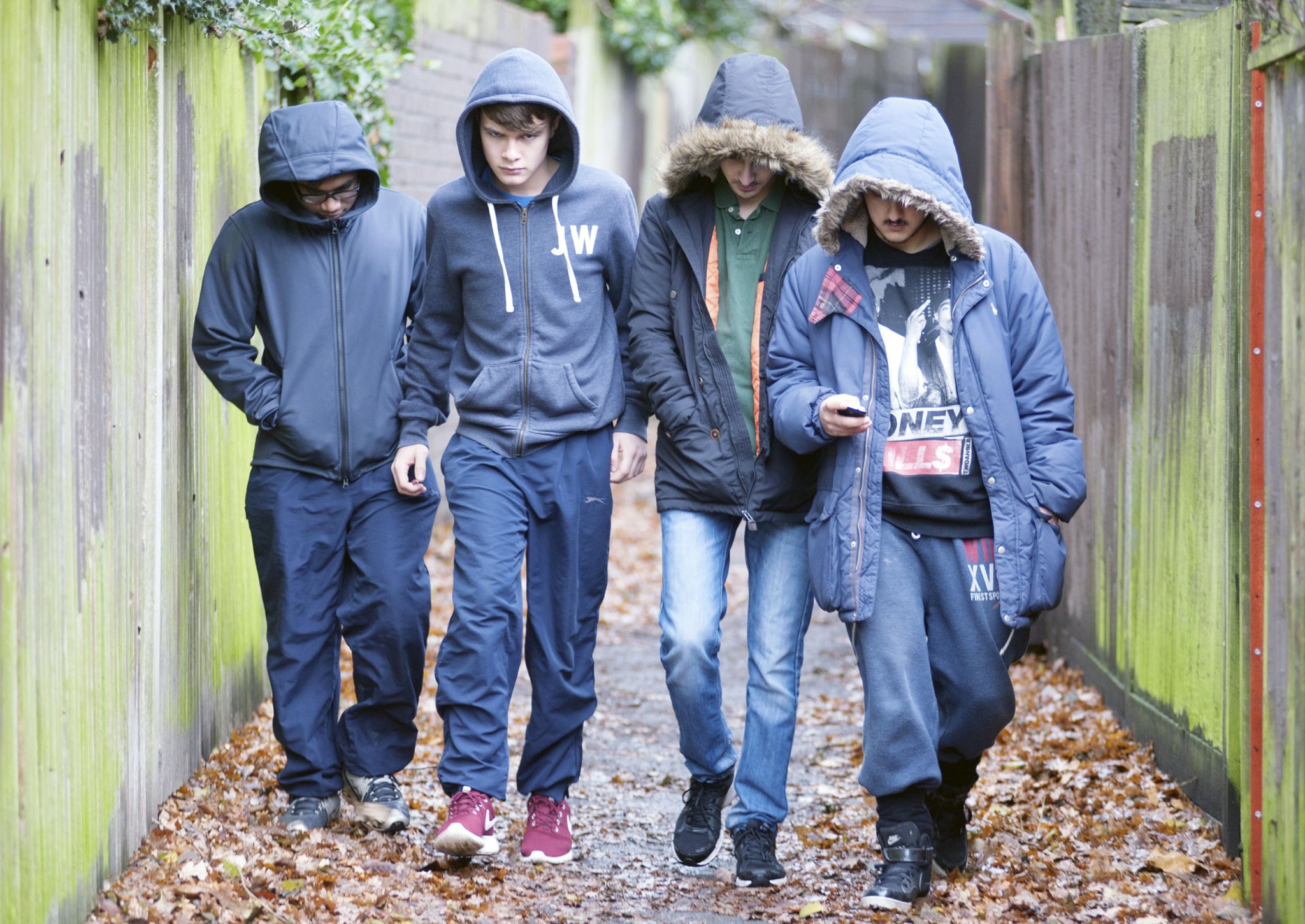Who should get credit for declining youth crime? Young people, of course
They are responsible for a record drop in the crime rate, so we should stop demonising them

Some teenagers tried to rob me the other evening. I was walking my dog on an isolated stretch of the Manchester Cycleway between the run-down neighbourhoods of Gorton and Levenshulme around dusk.
A gang of about half a dozen boys and girls, aged around 15 and sporting urban uniform tracksuit bottoms and hoodies came towards me.
They took one look at my dog, crouched down, and said something approximating: “Oo look atchoo! What a gorgeous liddle puppy wuppy, yesh you are. I'm going to steal you and take you home with me. Come on, come with me doggie...”
They then danced off in the opposite direction, with my pliant little mutt skipping merrily after them. I let them escape a few yards before calling him to me. As he obediently galloped back, the young bandits gave some melodramatic wails, 'No! Come back!' then we all laughed, waved, and went our separate ways.
Not exactly Eden Lake, I know. Nonetheless, this little non-event illustrates a stark but seldom-noted truth about our young people. They are remarkably law-abiding.
The latest statistics from the Ministry of Justice show that the number of people involved with the criminal justice system is at the lowest level since records began in 1970, and the drop is very largely driven by young people.
In 2007 there were 126,500 prosecutions of juveniles, in 2013 there were 48,000. Young people accounted for only 3% of defendants prosecuted in 2013 compared to 7% in 2007.
Over a period of time when the policy of has been to use more and longer custodial sentences, the number of young people in custody has dropped from around 3,000 in 2007/8 to an average of 1,233 last year.
The stubborn remnants of the hell-in-a-handcart brigade will doubtless attribute this to police fiddling their figures, or insist that nobody reports crimes to the police any more.
I hate to splash sunshine on their cherished pessimism, but we see the exact same trends coming through from victim surveys, and from independent sources such as A&E admissions resulting from violent crimes. Some of the crimes which are hardest to sweep under the carpet, such as homicides and firearms offences, have shown some of the largest drops.
The Manchester Cycleway itself offers a vivid example of change. A seven mile stretch of converted railway line, flanked by banks of nettles and far from the reach of police patrols or the panopticon gaze of CCTV.
It is the natural habitat of inner city youth, and you do still see them hanging out beneath the countless bridges. There are those who are swigging cider or rolling wobbly spliffs, but their numbers too are on the decline.
The graffiti in the underpasses has mostly been there for years with nothing added or changed. Twenty, even ten years ago I would not have dared venture there alone and on foot, for fear of the young muggers and gun-toting gangs that once made south Manchester notorious. Today it feels safe, even as night falls.
Of course it is not a utopia. In this city and every other there remain some dangerous individuals and criminal gangs. My dog and I have occasionally had to make a tactical change of route when we sense an air of hostility around the park benches or the underpasses.
Local or national headlines occasionally present us with horrific reminders of humanity's darker side, notably the recent savage killing of teacher Ann Maguire.
There are doubtless some parts of the country where the improvements to our safety lag far behind the rest. Such exceptions should not leave us blinkered to the rule.
Explanations for the dramatic change in the social landscape of Britain remain hotly debated. There are theories on the table ranging from environmental lead pollution to more effective policing and crime prevention technology, or the acceptability of physical punishment and our growing sensitivity to child abuse.
Others suggest that delinquent criminality has not gone away, but has reinvented itself in less visible incarnations. The truth is most probably a combination of all of the above. However the most obvious and simple solution may be the most significant.
It has long been said that the devil makes work for idle hands, and a lot of juvenile delinquency has always been a product of boredom. It may simply be the case that when young people have a choice of smartphone, tablet and games console in front of them, they feel less need to get pissed on cheap cider and smash up a bus shelter.
It’s true, but having said that, this explanation still seems a trifle churlish. As a society we have few hesitations in laying the blame on our young people when things go badly. But we should be equally quick to offer applause when things go right.
The inescapable truth is that young people today are less criminal, less violent, less dangerous than at any time in recent memory, and credit for that goes not to Sony, Apple or Microsoft, but to young people themselves.
Join our commenting forum
Join thought-provoking conversations, follow other Independent readers and see their replies
Comments
Bookmark popover
Removed from bookmarks